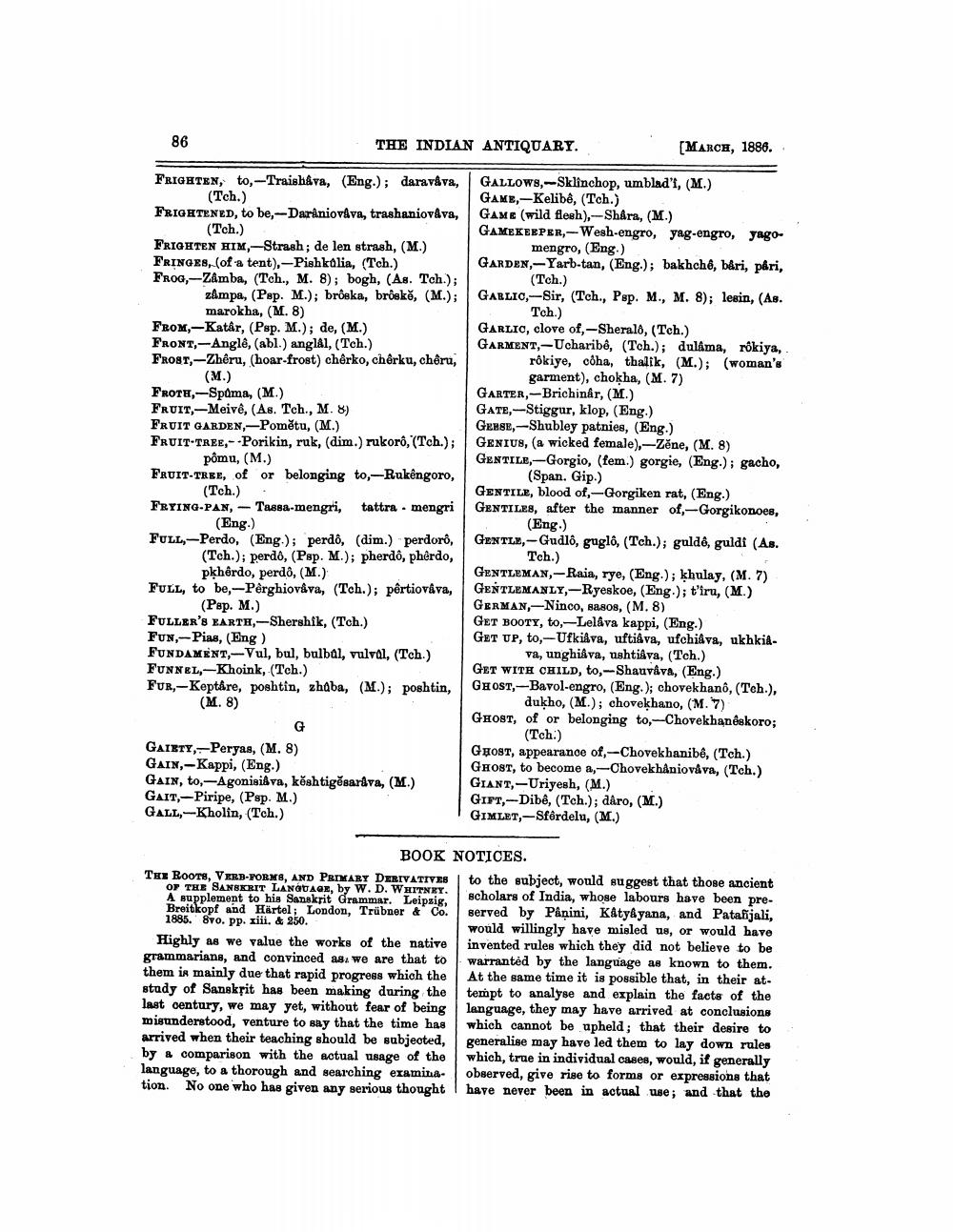________________
86
THE INDIAN ANTIQUARY.
FRIGHTEN, to,-Traishâva, (Eng.); daraváva, (Tch.) FRIGHTENED, to be,-Darâniováva, trashaniováva, (Tch.)
FRIGHTEN HIM,-Strash; de len strash, (M.) FRINGES, (of a tent),-Pishkolia, (Tch.) FROG,-Zâmba, (Tch., M. 8); bogh, (As. Tch.); zampa, (Pap. M.); brôska, brôskě, (M.); marokha, (M. 8)
FROM,-Katar, (Psp. M.); de, (M.) FRONT,-Anglê, (abl.) anglal, (Teh.) FROST,-Zhêru, (hoar-frost) chêrko, chêrku, chêru, (M.) FROTH,-Spama, (M.)
FRUIT,-Meivê, (As. Tch., M. 8) FRUIT GARDEN,-Pomětu, (M.) FRUIT-TREE,--Porikin, ruk, (dim.) rukorô, (Tch.);
pômu, (M.)
FRUIT-TREE, of or belonging to,-Rukêngoro,
(Tch.)
GALLOWS,-Sklinchop, umblad'i, (M.) GAME,-Kelibê, (Tch.)
GAME (wild flesh),-Shara, (M.) GAMEKEEPER,-Wesh-engro, yag-engro, yagomengro, (Eng.)
GARDEN,-Yarb-tan, (Eng.); bakhchê, bâri, pâri,
(Tch.) GARLIC,-Sir, (Tch., Pap. M., M. 8); lesin, (As. Tch.)
GARLIC, clove of,-Sheralô, (Teh.) GARMENT,-Ucharibê, (Tch.); duláma, rôkiya, rôkiye, côha, thalik, (M.); (woman's garment), chokha, (M. 7) GARTER,-Brichinår, (M.) GATE,-Stiggur, klop, (Eng.) GEESE,-Shubley patnies, (Eng.) GENIUS, (a wicked female),-Zěne, (M. 8) GENTILE,-Gorgio, (fem.) gorgie, (Eng.); gacho, (Span. Gip.)
GENTILE, blood of,-Gorgiken rat, (Eng.)
FRYING-PAN, Tassa-mengri, tattra mengri GENTILES, after the manner of,-Gorgikonoes,
(Eng.)
(Eng.)
FULL,-Perdo, (Eng); perdô, (dim.) perdorô, (Tch.); perdó, (Psp. M.); pherdô, phêrdo, pkhêrdo, perdô, (M.)
FULL, to be,-Pêrghiovâva, (Tch.); pêrtiováva, (Pap. M.)
FULLER'S EARTH,-Shershik, (Tch.) FUN,-Pias, (Eng)
FUNDAMENT, Vul, bul, bulbâl, vulval, (Tch.) FUNNEL,-Khoink, (Tch.)
FUR,-Keptâre, poshtin, zhaba, (M.); poshtin, (M. 8)
G
GAIETY,Peryas, (M. 8) GAIN,-Kappi, (Eng.)
GAIN, to,-Agonisiâva, koshtigĕsarâva, (M.) GAIT,-Piripe, (Psp. M.) GALL,-Kholin, (Tch.)
BOOK
THE ROOTS, VERB-FORMS, AND PRIMARY DERIVATIVES OF THE SANSKRIT LANGUAGE, by W. D. WHITNEY. A supplement to his Sanskrit Grammar. Leipzig, Breitkopf and Härtel; London, Trübner & Co. 1885. 8vo. pp. xiii. & 250.
[MARCH, 1886.
Highly as we value the works of the native grammarians, and convinced as we are that to them is mainly due that rapid progress which the study of Sanskrit has been making during the last century, we may yet, without fear of being misunderstood, venture to say that the time has arrived when their teaching should be subjected, by a comparison with the actual usage of the language, to a thorough and searching examination. No one who has given any serious thought
GENTLE,-Gudlô, guglô, (Tch.); guldê, guldi (As.
Tch.)
GENTLEMAN,-Raia, rye, (Eng.); khulay, (M. 7) GENTLEMANLY,-Ryeskoe, (Eng.); t'iru, (M.) GERMAN,-Ninco, sasos, (M. 8) GET BOOTY, to,-Lelâva kappi, (Eng.) GET UP, to,-Ufkiåva, uftiâva, ufchiâva, ukhkiava, unghiâva, ushtiâva, (Tch.) GET WITH CHILD, to,-Shauvâva, (Eng.) GHOST,-Bavol-engro, (Eng.); chovekhanô, (Teh.), dukho, (M.); chovekhano, (M. 7) GHOST, of or belonging to,-Chovekhanêskoro; (Tch:)
GHOST, appearance of,-Chovekhanibê, (Tch.) GHOST, to become a,-Chovekhâniováva, (Tch.) GIANT,-Uriyesh, (M.) GIFT,-Dibê, (Tch.); daro, (M.) GIMLET,-Sfêrdelu, (M.)
NOTICES.
to the subject, would suggest that those ancient scholars of India, whose labours have been preserved by Panini, Katyayana, and Patanjali, would willingly have misled us, or would have invented rules which they did not believe to be warranted by the language as known to them. At the same time it is possible that, in their attempt to analyse and explain the facts of the language, they may have arrived at conclusions which cannot be upheld; that their desire to generalise may have led them to lay down rules which, true in individual cases, would, if generally observed, give rise to forms or expressions that have never been in actual use; and that the




